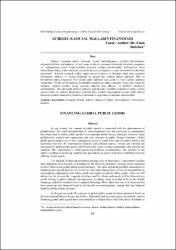| dc.contributor.author | Dedebek, Emin | |
| dc.date.accessioned | 2017-07-10T14:10:13Z | |
| dc.date.available | 2017-07-10T14:10:13Z | |
| dc.date.issued | 2017 | |
| dc.identifier.uri | https://hdl.handle.net/20.500.11776/1874 | |
| dc.description.abstract | Küresel kamusal mallar kavramı, içinde bulunduğumuz yüzyılda küreselleşme olgusuyla birlikte anılmaktadır. Klasik kamu maliyesi yazınında tüketimde rekabetin olmaması ve dışlanamama temel karakteristikleri kamusal malları tanımlamakta kullanılırken hızla küreselleşen dünya, kamu maliyesi yazınında da yeni yaklaşımlar ve yeni kavramları beraberinde getirmiştir. Küresel kamusal mallar sadece kamu maliyesi ve iktisadın değil aynı zamanda uluslararası ilişkiler ve siyaset biliminin en güncel ilgi alanları haline gelmiştir. Mal ve hizmetlerin küresel kamusal mal olarak kabul edilmesi için gerek ve yeter şartları taşıması zorunludur. Gerek şart bu malların kamusallık karakterine sahip olmasıdır. Yeter şart olarak bu malların sunumu sonucu fayda yayılma alanının tüm ülkeleri ve nesilleri etkilemesi gerekliliğidir. Bu çalışmada küresel kamusal mal kavramı öncelikle geleneksel maliye teorisi çerçevesinde ele alınmış devamında üzerinde hala yazında tartışmaların devam ettiği küresel kamusal malların finansman yöntemleri kuramsal ve uygulama açılarından incelenmiştir. | en_US |
| dc.description.abstract | In our century, the concept of public goods is associated with the phenomenon of globalization. The main characteristics of non-competition and non-exclusion in consumption have been used to define public goods in conventional public finance literature; however, rapid globalization entailed new approaches and new concepts in public finance literature. Global public goods became one of the contemporary focus of interest not only for public finance and economics but also for international relations and political science. Goods and services are considered as global public goods and services only when a certain requirement and criterion are satisfied. This requirement is about possessing publicity characteristics. The criterion is the sphere of influence involving countries and generations as a part of the areas benefiting from the offering of such goods. The method of financing and actors playing a role in financing is a noteworthy headline after definition of such goods as indicated by the relatively extensive coverage given compared to other fields in the global public goods literature. The most important problem encountered in financing these goods and services is the fact that main characteristic of lack of excludability in consumption experienced with public goods also applies to global public goods. There are still debates on the present day's agenda asto how and by whom such goods will be financed in a world lacking a global authority having power to charge taxes at global level as the default financing method at national level is general financing. More often than not, it is observed that these goods are not financed based on the benefit received principle, instead, they are financed based on ability-to-pay principle. In the present study, the concept of global public goods has been addressed based on the conventional finance theory and further, theoretical and practical aspects of methods used in financing global public goods have been studied as a subject that is still in the focus of debates in the literature. As is the case with public goods, the first solution that comes to mind about financing global public goods is the utilization of public but global resources in financing. Sources and methods of financing global public goods are studied in four main categories in the literature. Different types of sources of finance, namely, " Public sources" consisting of national and international constituents, non-profit organizations, multi-national companies and "private sources" involving individuals and "joint venture sources" created by nation states, international organizations, non-profit organizations and multi-national companies for the purpose of producing global public goods, are suggested in the literature based on the main criterion " internalizing externalities" that allows allocation of benefits and costs generated and incurred as a result of consuming and producing global public goods to those involved in that production and consumption activities. Problems encountered in the present day about financing global public goods, particularly in terms of internalizing externalities show that, perhaps, the most important and effective method of financing is public sources. | en_US |
| dc.language.iso | tur | en_US |
| dc.publisher | Namık Kemal Üniversitesi,İktisadi ve İdari Bilimler Fakültesi | en_US |
| dc.rights | info:eu-repo/semantics/openAccess | en_US |
| dc.subject | Kamusal Mallar | en_US |
| dc.subject | Küresel Kamusal Mallar | en_US |
| dc.subject | Küreselleşme | en_US |
| dc.subject | Uluslararası İlişkiler | en_US |
| dc.title | KÜRESEL KAMUSAL MALLARIN FİNANSMANI | en_US |
| dc.title.alternative | FINANCING GLOBAL PUBLIC GOODS | en_US |
| dc.type | article | en_US |
| dc.relation.ispartof | Balkan Sosyal Bilimler Dergisi | en_US |
| dc.department | Fakülteler, İktisadi ve İdari Bilimler Fakültesi, Maliye Bölümü | en_US |
| dc.authorid | 193234 | en_US |
| dc.identifier.volume | 6 | |
| dc.identifier.issue | 11 | |
| dc.identifier.startpage | 19 | en_US |
| dc.identifier.endpage | 32 | en_US |
| dc.relation.publicationcategory | Makale - Ulusal Hakemli Dergi - Kurum Öğretim Elemanı | en_US |



















